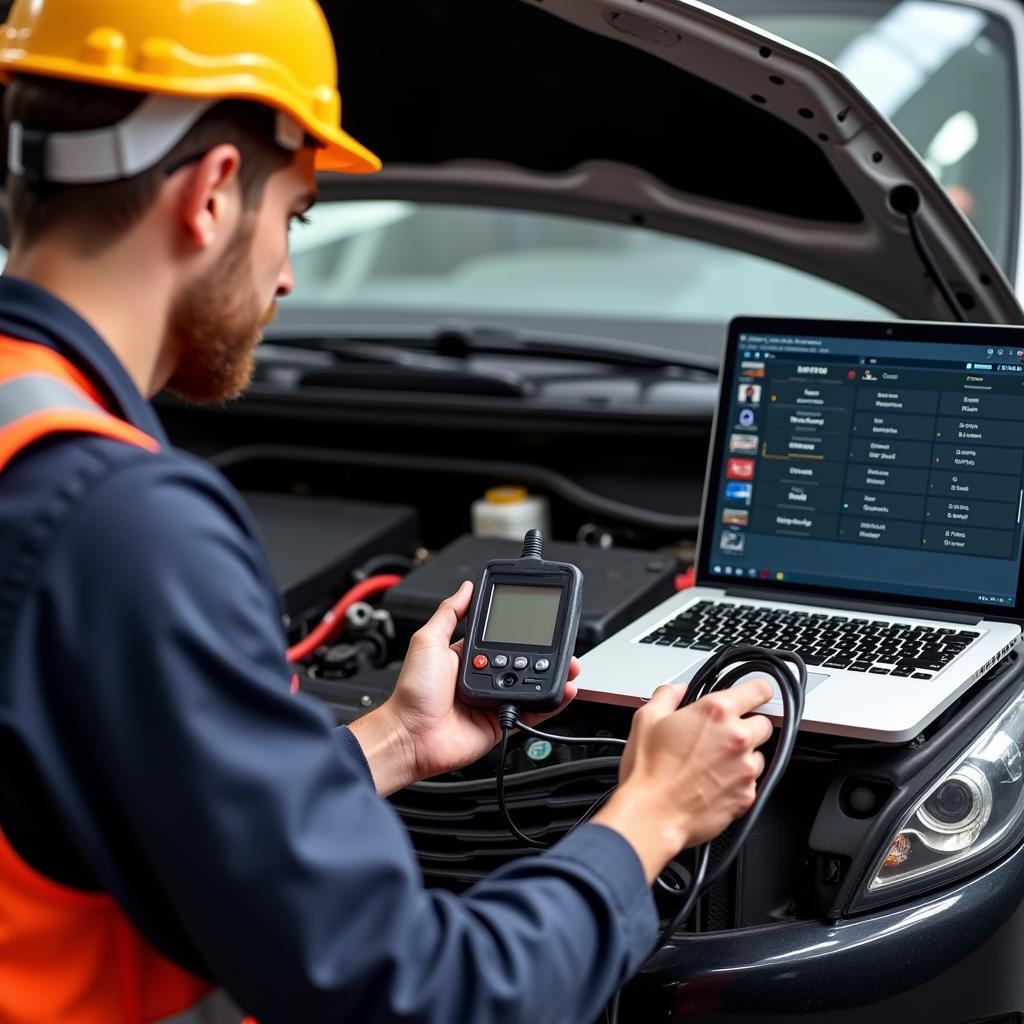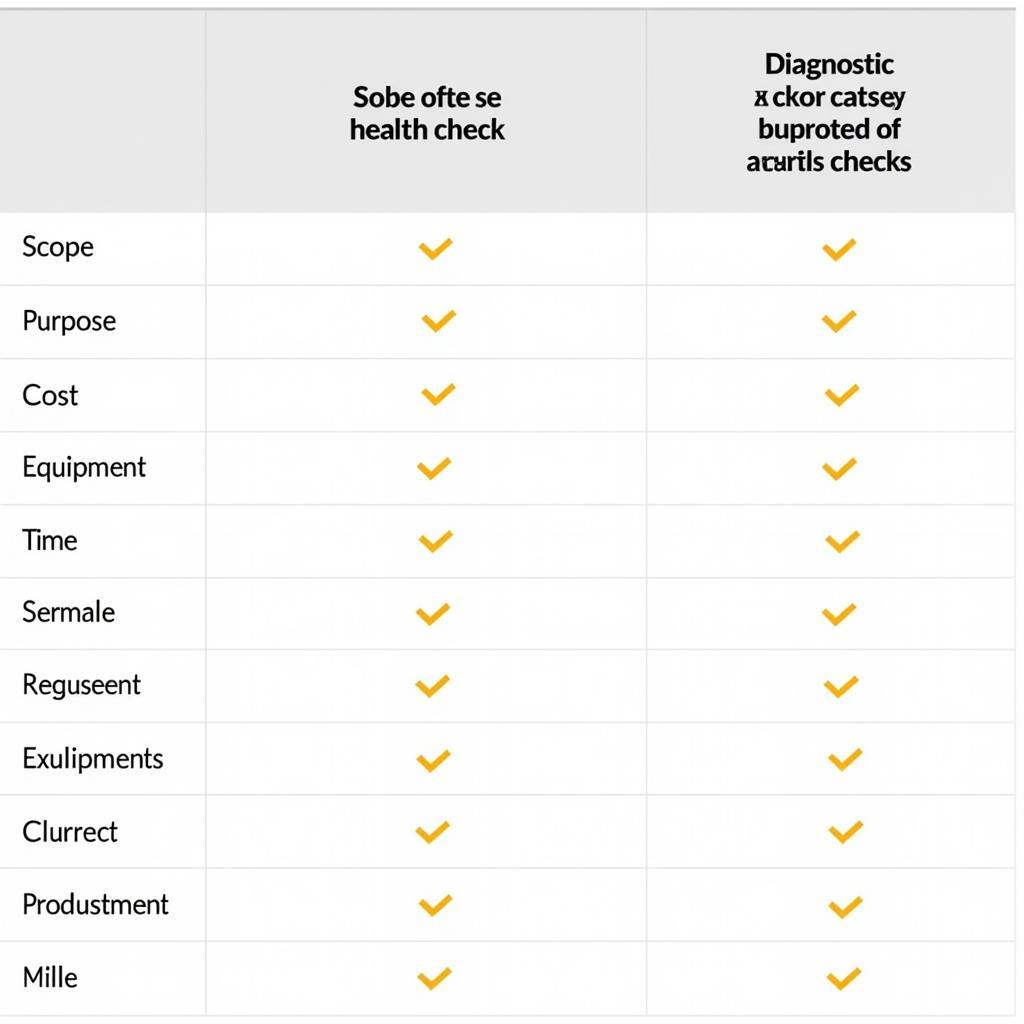Many car owners wonder if a health check is the same as a diagnostic check. While they both assess your vehicle’s condition, there are key differences that impact what information you receive and how much each service costs. This article will explore these differences and help you understand which check is right for your specific needs.
Understanding the Car Health Check
A car health check provides a general overview of your car’s vital components. Think of it like a routine check-up with your doctor. It aims to identify potential issues before they become major problems. This service typically includes checks on your tires, brakes, fluids, lights, and exhaust.
A health check is excellent for preventative maintenance and catching minor issues early. It’s a relatively quick and affordable service, often offered during regular servicing or MOT tests. However, it doesn’t delve into the complex electronic systems of your car.
Delving Deeper: The Diagnostic Check
A diagnostic check, on the other hand, is a much more in-depth analysis of your car’s systems, including its computer and electronic components. It uses specialized equipment to pinpoint the root cause of a specific problem. Imagine this as visiting a specialist for a specific medical concern.
Diagnostic checks are crucial when you’re experiencing a noticeable issue with your vehicle, such as a warning light on your dashboard, unusual noises, or performance problems. While more expensive than a health check, a diagnostic check can save you money in the long run by accurately identifying the problem and preventing unnecessary repairs.
 Car Diagnostic Check Process
Car Diagnostic Check Process
Key Differences Between Health Check and Diagnostic Check
The core difference lies in the level of detail and the purpose of each check. Here’s a breakdown:
- Scope: Health checks cover basic components, while diagnostic checks delve into complex electronic systems.
- Purpose: Health checks focus on preventative maintenance, whereas diagnostic checks aim to identify the cause of a specific problem.
- Cost: Health checks are generally less expensive than diagnostic checks.
- Equipment: Diagnostic checks utilize specialized computer software and equipment.
- Time: Health checks are quicker than diagnostic checks, which can take longer depending on the complexity of the issue.
When to Choose a Health Check vs. a Diagnostic Check
Choosing the right check depends on your car’s current state and your concerns.
- Choose a health check if: Your car is running smoothly, and you want peace of mind and preventative maintenance.
- Choose a diagnostic check if: You’re experiencing a specific problem with your vehicle, such as a warning light, unusual noises, or performance issues.
 Health Check vs. Diagnostic Check Comparison Table
Health Check vs. Diagnostic Check Comparison Table
Is a Health Check Part of a Diagnostic Check?
A health check is not typically part of a diagnostic check. They are distinct services. However, some mechanics might perform a brief visual inspection during a diagnostic check, but this isn’t a comprehensive health check.
Can a Diagnostic Check Find Problems a Health Check Misses?
Absolutely. A diagnostic check can uncover issues hidden within the electronic systems, which a health check wouldn’t detect. For instance, a health check might not reveal a faulty sensor, while a diagnostic check can pinpoint the exact sensor causing the problem.
Expert Insights
“A regular car health check can be compared to a yearly physical, keeping your car in top shape and potentially avoiding costly repairs down the line,” says John Smith, ASE Certified Master Technician at Advanced Auto Solutions. “A diagnostic check, on the other hand, is like seeing a specialist – you go when you have a specific concern that needs expert attention.”
“Don’t underestimate the value of a diagnostic check,” adds Jane Doe, Lead Technician at Auto Experts. “It’s the most efficient way to accurately diagnose and fix problems, saving you time and money in the long run.”
Conclusion
While both health checks and diagnostic checks play a vital role in car maintenance, they serve different purposes. Understanding their differences will empower you to make informed decisions about your car’s care. By choosing the right type of check, you can ensure your vehicle remains reliable, safe, and performs at its best. Is your car acting up? Don’t hesitate to schedule a diagnostic check today.
FAQ
-
How often should I get a car health check? Generally, a health check every six months or alongside your regular service is sufficient.
-
How much does a diagnostic check cost? The cost varies depending on the make and model of your car and the complexity of the issue, but it typically ranges between $80 and $150.
-
Can I perform a diagnostic check myself? While basic OBD-II scanners are available for home use, they often don’t provide the level of detail or expertise a professional diagnostic check offers.
-
What if my car doesn’t have any obvious problems? A regular health check is still recommended for preventative maintenance and early detection of potential issues.
-
How long does a diagnostic check take? It depends on the issue, but it can range from 30 minutes to a few hours.
-
What should I do after a diagnostic check? Discuss the results with your mechanic and decide on the appropriate repairs.
-
Will a health check identify all potential problems? While helpful, a health check might not catch every issue, particularly those related to complex electronic systems.
 Mechanic Explaining Diagnostic Results to Customer
Mechanic Explaining Diagnostic Results to Customer
Common Scenarios Requiring a Diagnostic Check:
- Check engine light illuminated
- Unusual noises from the engine or other components
- Poor fuel economy
- Decreased performance
- Problems with starting the car
Further Reading
- Understanding Your Car’s Warning Lights
- The Importance of Regular Car Maintenance
- Common Car Problems and Solutions
Need Help? Contact us via WhatsApp: +1(641)206-8880 or Email: [email protected]. Our 24/7 customer support team is ready to assist you.

Leave a Reply